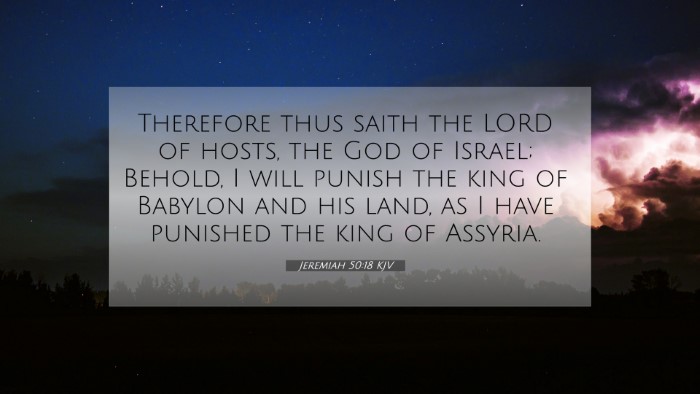Understanding Jeremiah 50:18
The Bible verse Jeremiah 50:18 states: "Therefore thus saith the Lord of hosts, the God of Israel; Behold, I will punish the king of Babylon and his land, as I have punished the king of Assyria."
Summary of Verse Meaning
This verse encapsulates God's assurance of judgment against Babylon, drawing parallels to His previous actions against Assyria. It illustrates a theme of divine justice, showcasing that nations and their powers are ultimately accountable to God.
Commentary Insights
-
Matthew Henry:
Matthew Henry emphasizes the certainty of God's judgments, describing how Babylon's fall is not only foreseen but also inevitable. He reflects on God's governance over the nations, underscoring His power to execute judgment against the pride and cruelty of empires.
-
Albert Barnes:
Albert Barnes notes the historical context of the verse, linking it to God's punishment of Assyria and foretelling a similar fate for Babylon. He highlights the unchanging nature of God’s justice, where all rulers and nations will eventually face repercussions for their actions.
-
Adam Clarke:
Adam Clarke explains the implications of God's will in punishing Babylon, emphasizing that this act serves as a warning to other nations. Clarke also suggests that by punishing the mightiest, God displays His sovereignty and serves justice in a world often riddled with tyranny.
Thematic Connections
This verse connects with the overarching theme of divine retribution present throughout the Scriptures. It serves as a reminder that no nation is beyond the reach of God's judgment, fostering an understanding of how God manages nations through a lens of accountability.
Bible Verse Cross-References
Jeremiah 50:18 can be cross-referenced with the following verses:
- Isaiah 14:22-23: God’s promise to destroy Babylon.
- Ezekiel 30:10: Mention of nations facing judgment.
- Revelation 18:2: Prophetic fall of Babylon as a symbol of larger themes of justice.
- 2 Kings 17:24: The fall of Israel and how God acted against an unrepentant nation.
- Daniel 5:30-31: The account of Babylon's fall.
- Jeremiah 25:12: God’s plan for Babylon’s punishment.
- Micah 2:3: Divine intent to bring judgment upon wicked nations.
- Psalm 75:7: God’s control over judgment and authority among nations.
- Habakkuk 1:6: The raising up of the Chaldeans as instruments of God's justice.
- Isaiah 47:1: A proclamation against the pride of Babylon.
Tools for Bible Cross-Referencing
To delve deeper into the meaning of Biblical verses and their interconnections, various tools can enhance your study:
- Bible Concordance: Helps locate specific words and their occurrences throughout the Bible.
- Bible Cross-Reference Guide: A resource that maps connections between verses for comparative analysis.
- Cross-Reference Bible Study: A method that utilizes various references to deepen understanding of themes.
- Bible Reference Resources: Collections of notes and themes that can be cross-referenced for in-depth study.
- Comprehensive Bible Cross-Reference Materials: Resources that compile multiple cross-references for thematic studies.
How to Use Bible Cross-References
Understanding how to find and use cross-references in the Bible involves:
- Identifying key themes in a verse, such as judgment in Jeremiah 50:18.
- Exploring verses that relate to these themes using a concordance.
- Comparing similar messages across both the Old and New Testaments.
- Utilizing Bible study tools to enhance contextual understanding.
- Creating thematic chains that connect various scriptures for sermon preparation.
Conclusion
Jeremiah 50:18 serves as a profound reminder of the sovereignty of God over nations and the inevitability of His justice. By exploring various cross-references and commentaries, one can uncover deeper insights both within this verse and in its connections to the broader narrative of Scripture.







